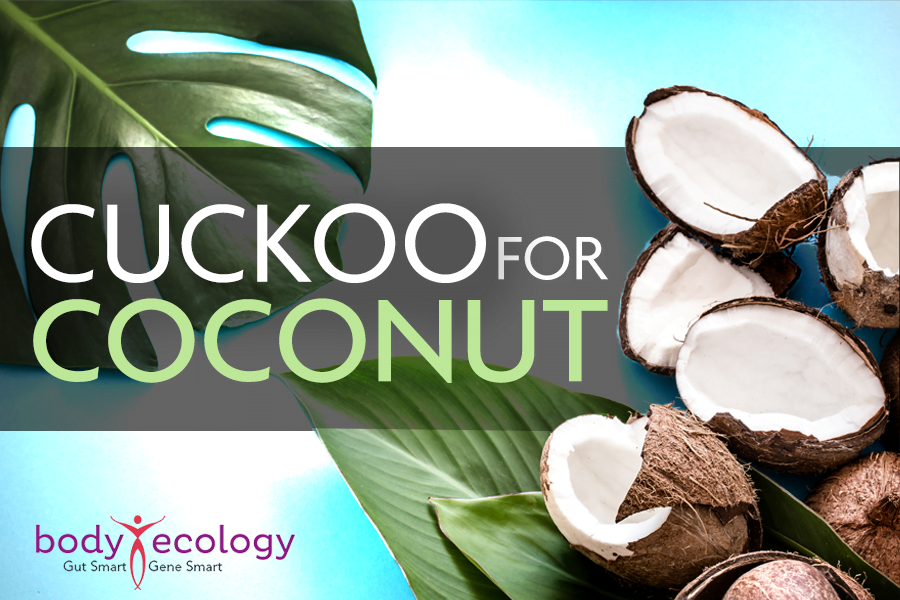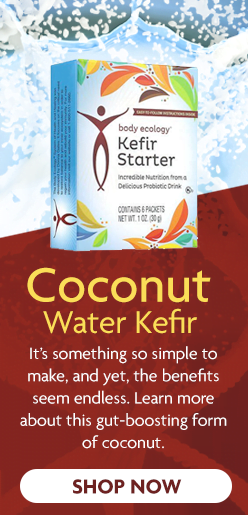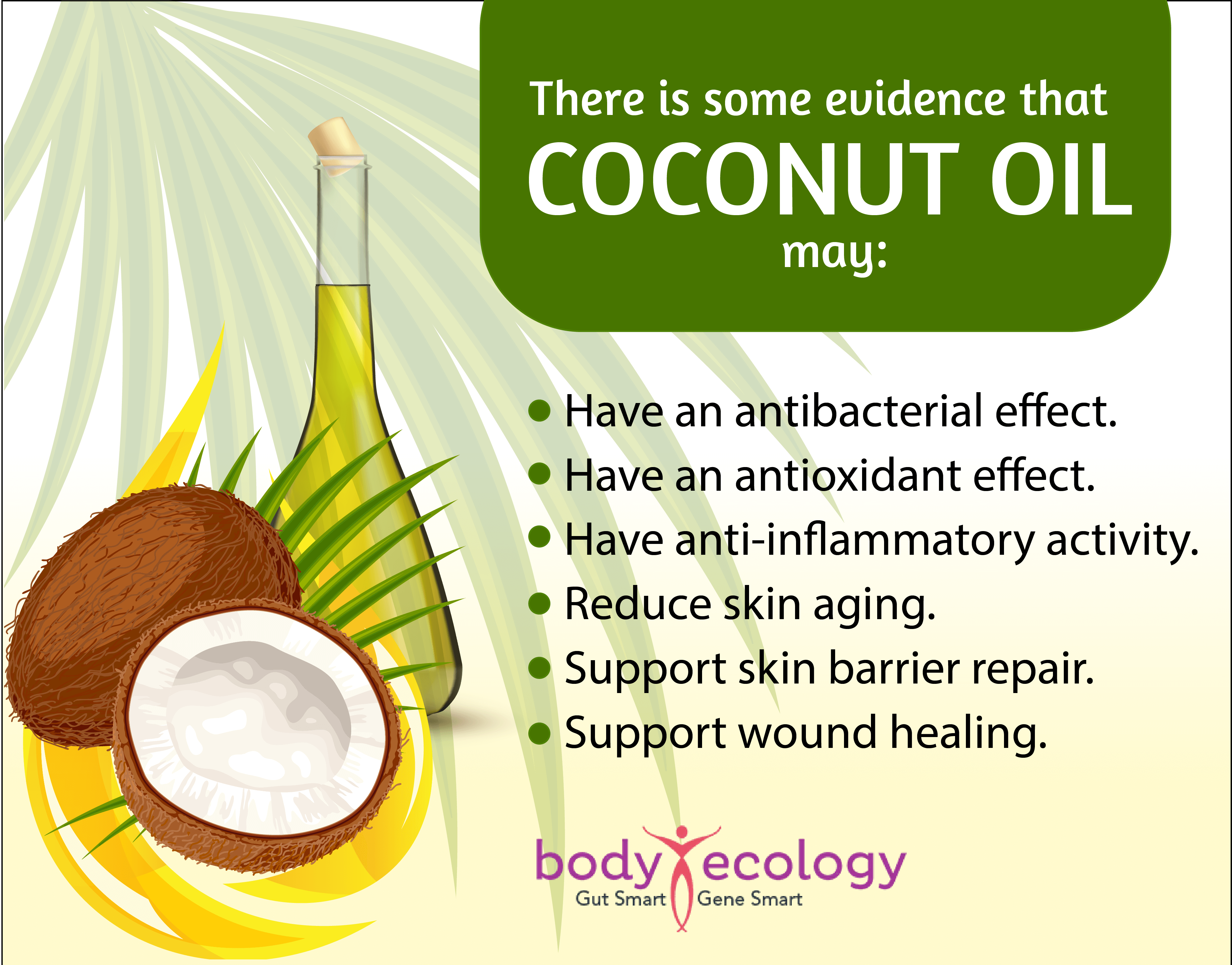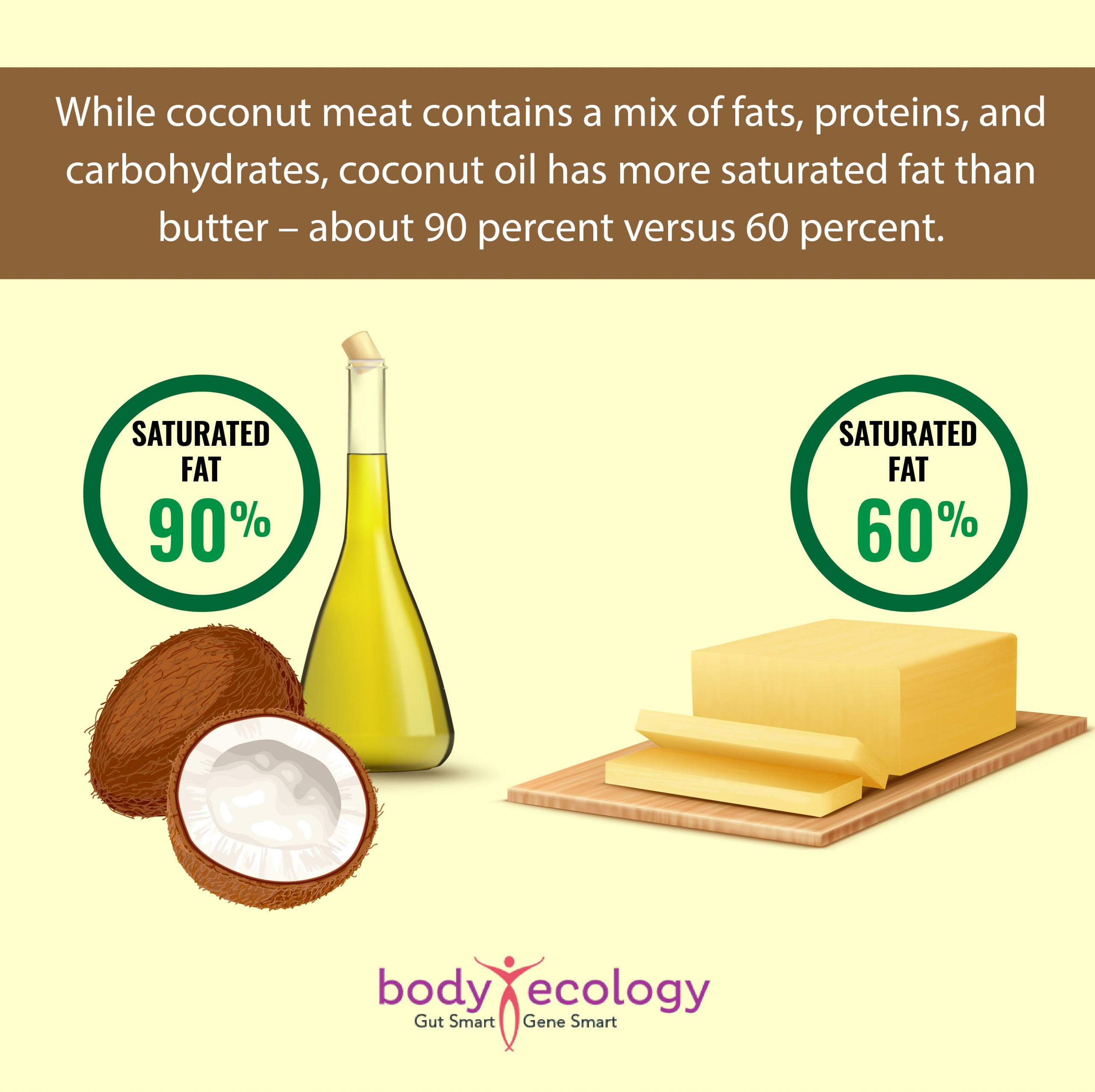
Cuckoo for coconut: Is it as healthy as you think?

Coconut, coconut, coconut. Everywhere you look, there’s coconut. In shampoo, lotion, energy bars, smoothies, and even as a natural mouthwash. But is coconut massively overhyped?
Is coconut milk good for you, or just another source of saturated fat? Let’s bust some coconut myths and see what the science has to say about any health benefits (or risks) of coconut.
Claim #1: Coconut is good for heart health.
Research studies show that a high intake of saturated fat tends to be linked to a higher risk of cardiovascular disease.1,2
So, why the claim that coconut oil could actually be good for the heart?
- This idea is based on limited evidence that medium-chain fats don’t have the same negative effects as saturated fats on the body’s lipid profile, i.e., various types of cholesterol and triglycerides.
- Most of the fat in coconut oil is medium-chain fatty acids or medium-chain triglycerides, and these have been seen to decrease cholesterol levels in the short-term by reducing bile absorption.3
- Over the long-term, however, any diet high in saturated fat can increase serum triglycerides, which are arguably a more important indicator for cardiovascular disease risk.
In a review of 21 research papers, including eight clinical trials and 13 observational studies, coconut oil was found to generally elevate total/low-density lipoprotein cholesterol more than non-tropical vegetable oils but less than butter.4
So, is coconut good for heart health?
Verdict: Well, these studies show that while coconut oil may be better for some people than butter or other animal fats, unsaturated fats are far better for reducing risk factors for cardiovascular disease. This would mean that olive, avocado, and fish oil are better choices.
Claim #2: Coconut is rich in antioxidants.
A diet high in antioxidants can help prevent oxidative damage to tissues in the body that can lead to disease and may also help prevent premature signs of aging.5
Coconut, like many plant-derived foods, is a source of antioxidants. Coconut milk, for instance, provides a greater level of antioxidants than cow’s milk and many plant milks. What’s more, these antioxidants seem to survive cooking, meaning that coconut milk dishes, such as a veggie-rich green curry, could be a good way to boost your antioxidant intake.3
However, it has to be said that coconut is also a lot fattier and, therefore, provides a lot more calories than fruits and vegetables.
Verdict: While coconut does supply antioxidants, it’s highly calorific and shouldn’t be your preferred source of antioxidants. Don’t use it and crowd out other antioxidant-rich foods in your diet.
Claim #3: Coconut is a traditional health food, so it’s good for you.
Those touting the health benefits of coconut often fall back on limited epidemiological evidence from indigenous populations where coconut is a normal part of the diet.6 The trouble is that the kind of coconut products eaten in such cultures are usually either the flesh of fresh coconut or freshly squeezed coconut cream.
In most countries where coconut has increased in popularity in recent years, fresh coconut is rare.
Instead:
- Consumers rely on processed coconut products, such as coconut oil, canned coconut milk, and coconut meal.
- Research shows that when coconut products are stored for more than two months, levels of short- and medium-chain fatty acids and aldehydes increase due to peroxidation of fats, i.e., the fats get damaged.7
- The longer the storage time, the less nutritional value in the coconut milk and other products.
It should also be noted that in populations where large amounts of coconut are consumed, and where this doesn’t seem to negatively affect cardiovascular health, people tend to eat less processed food in general and are more socially connected and active.
Verdict: Well, it’s difficult to draw meaningful conclusions about diet from large population studies, and not all coconut products are the same, especially fresh versus processed. So, while coconut might be part of a healthy diet in some places, those health benefits don’t always translate to other groups of people.
Claim #4: Coconut combats candida.
Some of the fatty acids in coconut have demonstrated antifungal activity in laboratory studies, leading to the idea that coconut might help tackle candida infections.
Studies in humans are limited, but a study in mice suggests that compared to a diet rich in beef fat or soybean oil, a coconut-oil-rich diet did help reduce colonization of the gastrointestinal tract with Candida albicans.8 Additionally, switching the beef-fat-diet mice to coconut oil helped to reduce C. albicans colonization.
In one small study looking at preterm babies, supplementing milk with coconut oil fatty acids also appeared to reduce colonization with C. albicans.9
Verdict: Maybe! There’s a reasonable expectation that the antifungal fatty acids in coconut oil could help keep candida and other fungal infections in check. For more serious fungal overgrowth, however, coconut oil might not be sufficient alone – there just isn’t the evidence to support dietary amounts of coconut as having a meaningful antifungal benefit.
Crisp, refreshing, and packed with probiotics that support gut health to help control candida: Have you tried CocoBiotic yet?
Claim #5: Coconut is good for your skin.

Aside from possibly being useful topically for isolated fungal overgrowth, coconut creams and lotions are often proclaimed to be a natural way to improve skin health.10,11
In one study, virgin coconut oil helped decrease the severity of atopic dermatitis in children and improved skin barrier function by reducing transepidermal water loss.12 Virgin coconut oil has also been seen to support speedier epithelization, meaning that wounds heal faster.11 And, coconut oil has antioxidant and anti-inflammatory effects that may help protect the skin against damage from ultraviolet light, although it shouldn’t be relied on as a sunscreen.13,14
In addition, one of the fatty acids in coconut oil, monolaurin, has an antimicrobial effect against the bacteria that cause acne, Propionibacterium acnes, as well as against Staphylococcus aureus and Staphylococcus epidermidis.15
Verdict: Coconut oil does appear to have a range of benefits when applied topically. It should be stressed, however, that most coconut-based products are not the same as pure virgin coconut oil. Instead, lotions, creams, shampoos, and other coconut-based products often contain very little actual coconut, meaning their benefits for skin health will also be limited.
Final thoughts: What’s the right kind of coconut?
If you’re curious about blood type and diet, Dr. Peter D’Adamo does not recommend the meat, oil, or coconut milk for any of the four blood types (A, O, B, AB).16 However, all blood types do well on coconut water — and fermenting it to remove the sugar is best!
All in all, while coconut may have a few limited benefits as a food and when used topically, too much focus on this one ingredient could stop you from including other healthy foods or taking other positive steps that are far better for your health.
If you’re going to include coconut in your diet, the water right out of the coconut is your best bet. Or, look for cultured coconut products (like this). You can also use Body Ecology’s Kefir Starter to ferment coconut water. When coconut water is “cultured” or fermented, the nutrients are preserved and enhanced.
For topical applications, consider using straight coconut oil rather than expensive moisturizers and other products that likely contain added ingredients that can actually damage your skin. Coconut oil can also be used as a carrier for essential oils.
As always, remember the Body Ecology Principle of Uniqueness — what matters most is what works for you. Eat the foods that most benefit your body at this present moment. Keep an open mind as you listen to your body’s rhythms and changing needs.
REFERENCES:
- 1. Jaike Praagman, Linda E.T. Vissers, Angela A. Mulligan, Anne Sofie Dam Laursen, Joline W.J. Beulens, Yvonne T. van der Schouw, Nicholas J. Wareham, Camilla Plambeck Hansen, Kay-Tee Khaw, Marianne Uhre Jakobsen, Ivonne Sluijs. Consumption of individual saturated fatty acids and the risk of myocardial infarction in a UK and a Danish cohort. International Journal of Cardiology, 2018; DOI: 10.1016/j.ijcard.2018.10.064.
- 2. Jun Li, Qi Sun. Consumption of saturated fatty acids and coronary heart disease risk. International Journal of Cardiology, 2019; DOI: 10.1016/j.ijcard.2019.01.022.
- 3. Karunasiri, Asiri N. Antioxidant and Nutritional Properties of Domestic and Commercial Coconut Milk Preparations. Int J Food Sci. 2020; 2020: 3489605. Published online 2020 Aug 1. doi: 10.1155/2020/3489605.
- 4. Eyres L, Eyres MF, Chisholm A, Brown RC. Coconut oil consumption and cardiovascular risk factors in humans. Nutr Rev. 2016 Apr;74(4):267-80. doi: 10.1093/nutrit/nuw002. Epub 2016 Mar 5. PMID: 26946252; PMCID: PMC4892314.
- 5. Anne M. Walk, Caitlyn G. Edwards, Nicholas W. Baumgartner, Morgan R. Chojnacki, Alicia R. Covello, Ginger E. Reeser, Billy R. Hammond, Lisa M. Renzi-Hammond, Naiman A. Khan. The Role of Retinal Carotenoids and Age on Neuroelectric Indices of Attentional Control among Early to Middle-Aged Adults. Frontiers in Aging Neuroscience, 2017; 9 DOI: 10.3389/fnagi.2017.00183.
- 6. Vanga SK, Raghavan V. How well do plant based alternatives fare nutritionally compared to cow’s milk? J Food Sci Technol. 2018 Jan;55(1):10-20. doi: 10.1007/s13197-017-2915-y. Epub 2017 Nov 2. PMID: 29358791; PMCID: PMC5756203.
- 7. Tinchan P, Lorjaroenphon Y, Cadwallader KR, Chaiseri S. Changes in the profile of volatiles of canned coconut milk during storage. J Food Sci. 2015 Jan;80(1):C49-54. doi: 10.1111/1750-3841.12730. Epub 2014 Dec 22. PMID: 25533179.
- 8. Gunsalus KT, Tornberg-Belanger SN, Matthan NR, Lichtenstein AH, Kumamoto CA. Manipulation of Host Diet To Reduce Gastrointestinal Colonization by the Opportunistic Pathogen Candida albicans. mSphere. 2015 Nov 18;1(1):e00020-15. doi: 10.1128/mSphere.00020-15. PMID: 27303684; PMCID: PMC4863630.
- 9. Arsenault AB, Gunsalus KTW, Laforce-Nesbitt SS, Przystac L, DeAngelis EJ, Hurley ME, Vorel ES, Tucker R, Matthan NR, Lichtenstein AH, Kumamoto CA, Bliss JM. Dietary Supplementation With Medium-Chain Triglycerides Reduces Candida Gastrointestinal Colonization in Preterm Infants. Pediatr Infect Dis J. 2019 Feb;38(2):164-168. doi: 10.1097/INF.0000000000002042. PMID: 29596218; PMCID: PMC6604858.
- 10. Varma SR, Sivaprakasam TO, Arumugam I, Dilip N, Raghuraman M, Pavan KB, Rafiq M, Paramesh R. In vitro anti-inflammatory and skin protective properties of Virgin coconut oil. J Tradit Complement Med. 2018 Jan 17;9(1):5-14. doi: 10.1016/j.jtcme.2017.06.012. PMID: 30671361; PMCID: PMC6335493.
- 11. Nevin KG, Rajamohan T. Effect of topical application of virgin coconut oil on skin components and antioxidant status during dermal wound healing in young rats. Skin Pharmacol Physiol. 2010;23(6):290-7. doi: 10.1159/000313516. Epub 2010 Jun 3. PMID: 20523108.
- 12. Evangelista MT, Abad-Casintahan F, Lopez-Villafuerte L. The effect of topical virgin coconut oil on SCORAD index, transepidermal water loss, and skin capacitance in mild to moderate pediatric atopic dermatitis: a randomized, double-blind, clinical trial. Int J Dermatol. 2014 Jan;53(1):100-8. doi: 10.1111/ijd.12339. Epub 2013 Dec 10. PMID: 24320105.
- 13. Kim S, Jang JE, Kim J, Lee YI, Lee DW, Song SY, Lee JH. Enhanced barrier functions and anti-inflammatory effect of cultured coconut extract on human skin. Food Chem Toxicol. 2017 Aug;106(Pt A):367-375. doi: 10.1016/j.fct.2017.05.060. Epub 2017 May 28. PMID: 28564614.
- 14. Korać, Radava & Khambholja, Kapil. (2011). Potential of herbs in skin protection from ultraviolet radiation. Pharmacognosy reviews. 5. 164-73. 10.4103/0973-7847.91114.
- 15. Preuss HG, Echard B, Enig M, Brook I, Elliott TB. Minimum inhibitory concentrations of herbal essential oils and monolaurin for gram-positive and gram-negative bacteria. Mol Cell Biochem. 2005 Apr;272(1-2):29-34. doi: 10.1007/s11010-005-6604-1. PMID: 16010969.
- 16. D’Adamo, Peter. Eat Right 4 Your Type: Revised Edition. ARROW (YOUNG), 2017.









